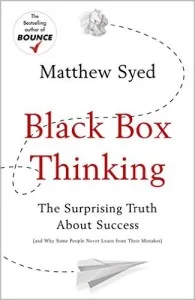 Matthew Syed, a columnist at The Times, delves into accountability in his new book “Black Box Thinking: The Surprising Truth About Success.” Syed argues that the fear of making mistakes leads to some of the most substantial organizational errors. He believes continuing with a failing mission — with the awareness it’s not working — is making a psychological attempt to avoid blame and ownership. Syed explains the relationship between this fear of failure and the human tendency to wrongly attribute blame, both in society and on an organizational level:
Matthew Syed, a columnist at The Times, delves into accountability in his new book “Black Box Thinking: The Surprising Truth About Success.” Syed argues that the fear of making mistakes leads to some of the most substantial organizational errors. He believes continuing with a failing mission — with the awareness it’s not working — is making a psychological attempt to avoid blame and ownership. Syed explains the relationship between this fear of failure and the human tendency to wrongly attribute blame, both in society and on an organizational level:
“One of the most well-established human biases is called the fundamental attribution error. It is about how the sense-making part of the brain blames individuals, rather than systemic factors, when things go wrong. When volunteers are shown a film of a driver cutting across lanes, for example, they infer that he is selfish and out of control. And this inference may indeed turn out to be true. But the situation is not always as cut-and-dried.”
Instead of blaming individuals from the get-go, Syed suggests two other approaches that embrace “forward accountability,” or “the responsibility to learn lessons so that future people are not harmed by avoidable mistakes.” (Forward accountability still holds individuals accountable, but it focuses on systematic errors that are more easily changed.) The Economist summarized these two organizational suggestions as follows:
“One solution is making it easy for people to own up or speak up, as the airline industry has learned to do better than any other. Mr Syed’s more novel suggestion, though, is the rigorous testing of business strategies. This forces people to make improvements. The gold standard is the ‘randomised control trial’ (RCT), in which a treatment group is compared with a control group.”
Companies like Google and Capital One rely on this systematic method to recognize failures and make small improvements that reap exponential gains. As Syed points out, RCT can make a positive impact in almost any context — organizations, governments, hospitals, and even schools.
